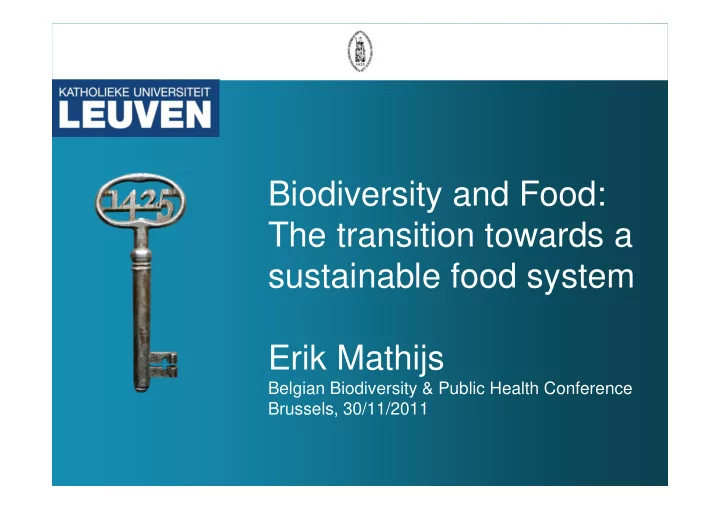

Biodiversity and Food: The transition towards a sustainable food system Erik Mathijs Belgian Biodiversity & Public Health Conference Brussels, 30/11/2011
Challenges towards 2050 • One billion people hungry • World population increases with 30% and will live primarily in megacities in the South • Incomes rise and cause a diet shift towards more meat and vegetable oils • Natural resources such as oil, P, water and biodiversity become scarce (reinforced by climate change) • Ecosystems are being destroyed such that essential ecosystem services are declining
Biodiversity hotspots Source: Leadley et al. (2010)
Systems analysis
Systems analysis Ecosystem services population resources ( source ) production consumption Natural recycling income Waste and ecosystems pollution ( sink )
Systems analysis Loss of ecosystem services Scarcity of natural resources Ecosystem services population resources ( source ) production consumption Natural recycling income Waste and ecosystems pollution ( sink ) Ecosystem destruction
Systems analysis Ecosystem services population (4) (1) resources ( source ) production consumption Natural (3) (2) (5) recycling income Waste and ecosystems pollution ( sink )
Building blocks 1. Increase productivity and input efficiency 2. Recycle nutrients 3. Increase consumption efficiency 4. Accelerate demographic transition 5. Reduce material consumption (affluence)
(1) Increase productivity and input efficiency • Close yield gap by better use of inputs • Increase production limits and input efficiency by crop improvement (conventional or GM) • Reduce yield losses
Achieving 95% of the yield potential would increase the amount of calories with 58% (Foley et al., Nature, 2011, 478:337-342)
(2) Recycling nutrients • Within the agroecosystem – Improve soils – … • Outside of the agroecosystem: – Energy – Pharma – …
(3) Increase consumption efficiency • Reduce food waste – Low price food – 10% of income spent on food • Change diet composition towards health recommendations: – Less meat (100 g per day) – Less sugar – More vegetables and fruit The production of 1 kg beef requires 5-7 kg cereals and 15.000 liters water.
(4) Accelerate demografic transition • Education • Economic development • Rol and status of women
(5) Reduce material consumption • Dematerialisation not possible for food as services cannot be separated from product • No crops for biofuels • Sufficiency: decrease consumption to real needs – Consume less on a voluntary basis – Rationing – Financial instruments (e.g. fat tax)
Combining building blocks into a transition Source: VITO 15
www.urgenda.nl
Two Narratives • Narrative : discourse based on a coherent set of assumptions and principles underpinning and communicating a certain worldview • Levidow (2008): – descriptive accounts: claims about objective reality as threats, opportunities and imperatives – normative accounts: claims about necessary or desirable responses to that objective reality – policy instruments for carrying out those responses “Regardless of its stated aims, a dominant narrative succeeds in the normative sense of gaining resources and power, while pre-empting alternative futures” 17
The Productivity Narrative • The problem - World population 9.2 billion in 2050 - agricultural productivity slowing down - rising income levels shift diets to more protein rich food and will increase energy demand - serious threat that food demand will not be met - hunger and political instability - resource constraints and climate change limit the world’s capacity to expand food production. • The solution - Scientific advances have the potential to bring forward varieties, breeds and technologies that boost productivity and take into account resource scarcities and environmental problems - massive investments into R&D -removal of barriers to adoption by farmers, such as infrastructure, trade barriers and access to markets. MORE WITH LESS 18
The Sufficiency Narrative • The problem - World population 9.2 billion people in 2050 - dramatic environmental problems - no Earth capacity to support consumption - current food systems produce waste and overconsumption - mass health problems - destruction of important ecosystems will have dramatic feedback effects that undermine the foundations of our food systems - more poverty and conflict. • The solution - Scientific advances have the potential to bring forward agro-ecosystems that are both productive, respectful for ecosystems and resource saving - demand increases need to be mitigated through behavioural change - environmental externalities need to be internalized in markets -appropriate governance structures that address disruptive effect of trade. LESS IS MORE 19
Productivity Sufficiency Narrative Narrative “We should produce “We should more efficiently” consume less” No business model or Business model small niche market contested SYNTHESIS What is the integrative business model? 20
Can organic farming feed the world? • Is it possible to feed the world humanely and sustainably? • Is it possible to, in addition, also contribute to the world’s energy demand?
Can organic farming feed the world?
Can both paradigms be reconciled? Technological paradigms Genetic engineering Agroecological engineering Basic definition Deliberate modification of the Application of ecological science characteristics of an organism by to the study, design and the manipulation of its genetic management of sustainable material agroecosystems Implicit objective Engineering plants: modify plants Engineering systems: improve the to our best advantage by making structure of an agricultural system them productive in adverse to make every part work well; rely conditions or by designing them to on ecological interactions and fit new objective synergisms for soil fertility, productivity and crop protection Scientific paradigm underlying the Reductionism Ecology and holism technological paradigm Examples of subtrajectories Bt insect resistant plants, Biological control, cultivar progressing along the herbicide-tolerant plants virus- mixtures, agroforestry, habitat technological paradigm resistant plants etc. management techniques etc. Vanloqueren and Baret, Research Policy, 2009
CREPE (2011) Van tegenstelling naar synthese?
Recommend
More recommend